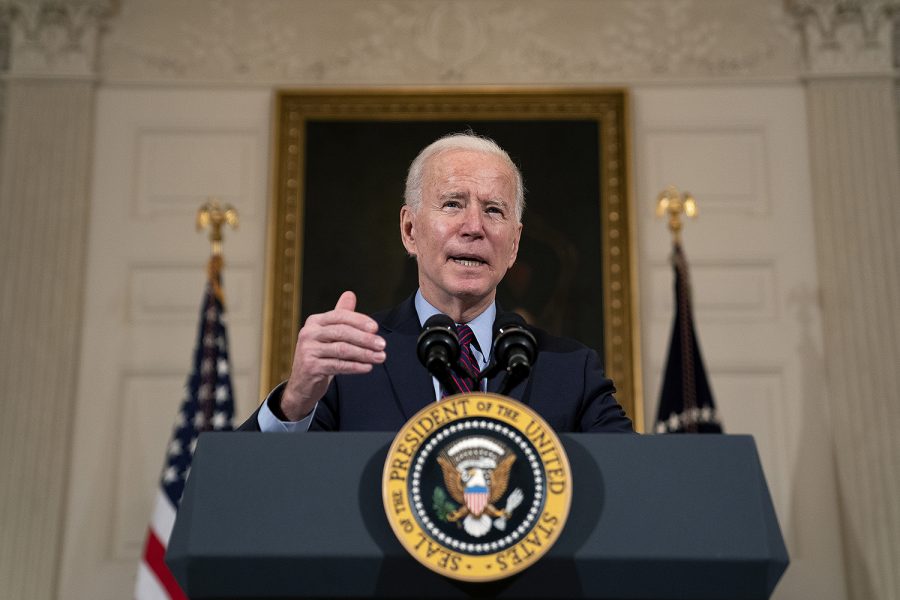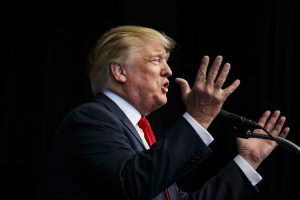How some of Joe Biden’s executive orders will affect Iowa
Of the 29 executive orders Biden has signed so far, directives on student loans, agriculture, health care, and DEI rank among those with significant action.
Stefani Reynolds/Pool/Getty Images/TNS
President Joe Biden delivers remarks on the national economy in the State Dining Room at the White House in Washington, D.C., on Feb. 5, 2021.
February 9, 2021
As the nation enters its first full month of Joe Biden’s presidency, the 46th president has signed 29 executive orders as of Feb. 9, with 17 of them signed within his first two days in office.
That number is more than his two most recent predecessors signed within that same time frame, and likely more than any president dating back to Franklin Delano Roosevelt’s time in office, according to The American Presidency Project and a Jan. 22 PolitiFact article.
Here’s a look at some of the orders he’s signed so far, including action on student loans, climate, agriculture, diversity education, and health care.
One of Biden’s earliest executive actions prolonged the existing freeze on student loan payments as a result of economic hardships plaguing Americans under the pandemic until at least Sept. 30.
The order, signed on Jan. 20, directs the U.S. acting Secretary of Education to pause loan payments and keep interest rates on loans at 0 percent, according to the White House.
Ian Mariani, press secretary for U.S. Rep. Cindy Axne, D-Iowa, said the extension is an important piece of economic relief for students trying to keep up with rent and debt payments during the pandemic.
“We did this originally in March and have continued to see the pandemic last longer than might have been first thought, and we were happy to see those things in place,” Mariani said.
A significant chunk of the platform Biden ran on in the 2020 election was to work on legislation to forgive student debt and invest in trade schools, though so far none of his executive actions have canceled any student debt.
Listed on his campaign website, Biden promised to pass sweeping legislation lessening the burden of student debt through actions such as including an immediate $10,000 student-loan cancellation in his COVID-19 response and increasing scrutiny on private lenders profiting from student-loan interest.
Biden signed an executive order on Jan. 27 outlining U.S. solutions to climate obstacles on both a national and global level, which emphasizes a reliance on scientific findings and the full backing of federal agencies.
A section of the order is devoted to agriculture and the conservation of public land and water properties, where Biden calls on farmers, ranchers, and landowners to help reduce harmful fossil fuel emissions by sequestering carbon through new farming methods.
“Among other details, President Biden’s climate executive order specifically directs USDA to collect input from farmers on how to use federal programs to encourage adoption of climate-smart agricultural practices that produce carbon reductions,” said Rachel Gantz, the communications director for the National Pork Producers Council.
RELATED: Immigration advocates say Biden’s executive orders a solid step
In a Jan. 20 executive order, Biden also revoked a permit Trump granted in March 2019 to continue development of the Keystone XL Pipeline, which, according to the Global Energy Institute, would significantly expand on an already existing oil pipeline and allow for massive amounts of the fossil fuels to be transported from Canada to as far south as Texas.
The expansion was originally proposed in 2008 and over the years has garnered much controversy, with proponents arguing in favor of a surge of job openings in building the pipeline and cheaper consumer gas when it reaches completion, and opponents arguing for the adverse effects it could have on the environment if it spills.
Sen. Chuck Grassley, R-Iowa, co-signed a letter with 25 other U.S. senators condemning Biden’s decision to halt development on the pipeline, stating that not following through on development would compromise thousands of middle-class jobs and billions in wage revenue, especially during the pandemic.
“Your actions will have grave consequences for our constituents and taking these actions on your very first week as president, with no input from those of us who represent these hard working Americans is counter to the desires of the American people who want practical, bipartisan solutions to our nation’s challenges, and who want policies that support working families,” the letter stated.
Under a single executive action on his inauguration day, Biden revoked two similar Trump-era executive orders relating to U.S. handlings of diversity and equity education.
One was signed by Trump in September and prevented federal agencies and institutions receiving federal grants from offering diversity, equity, and inclusion training that perpetuated race or sex “scapegoating.”
As federally funded institutions, public colleges and universities were among those affected, and as previously reported by The Daily Iowan, the restriction led to controversy regarding free speech on the University of Iowa’s own campus that ultimately led to the state Legislature’s involvement.
Following Biden’s executive order, federal agencies have up to 60 days to review and potentially rescind any previous direction to withhold federal funding to institutions in violation of Trump’s fall executive order.
The second order Biden revoked was signed by Trump on Nov. 2 and established the 1776 Commission, which was tasked with compiling a report before the end of Trump’s presidency refuting “reckless ‘re-education’ attempts that seek to reframe American history around the idea that the United States is not an exceptional country but an evil one,” according to an archived post from the White House.
The report, which was published just two days before Biden’s inauguration on Jan. 20 and intended to establish what Trump deemed an accurate account of the nation’s founding, was met with criticism from historians following its release including from the American Historical Association and nearly 50 co-signed organizations.
Loren Glass, UI English professor and president of the Iowa chapter of the American Association of University Professors, said the reversal of Trump’s order on diversity, equity, and inclusion training will allow universities like Iowa to invest energy into training and initiatives that will improve community climate for students and faculty of color.
“I think that this work is as important as the work that’s been done on sexual harassment in the workplace,” Glass said. “I see [DEI training] as only one part of a larger project working for greater equity and access across society of course, but specifically in higher public education institutions.”





